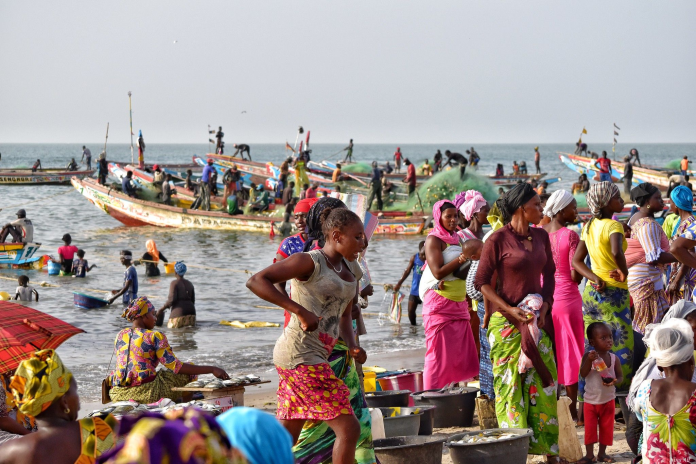
The declining rate of fish they capture in their fishing endeavors has left fishermen in The Gambia quite disappointed.
Speaking with The Point recently, a few fisherman in Bakau bemoaned the difficulties they have in their fishing because foreign ships are taking fish—including young fish and eggs—out of the seas of the Gambia.
One of the most well-liked industries in The Gambia, especially in Bakau, is fish farming. However, local fishermen claim that they are having a very hard time engaging in free fishing along their coastline because foreign boats are removing fish from The Gambia’s waterways by using smaller nets.
One of the busiest fish markets, Bakau Fish Landing Site used to provide fish to neighboring areas. Since many fishermen have sold their boats and some fish mongers have abandoned the wharf due to a shortage of fish catch these days, all that is left at the Bakau wharf and fishing site is the wind and sound of the waves. The Bakau Sea’s fish resource has almost been depleted by foreign boats’ “unscrupulous” fishing methods.
Omar Ceesay and Omar Sowe, fisherman, observed the water with disturbed expressions on their faces. They explained that when they had recently gone to the sea to farm, they had encountered foreign boats and their owners, who had prevented them from fishing. We have proof of it that they would fish seven to ten miles offshore and sometimes crush our boats, forcing them to capsize. “We always clash with big ship owners from Kafrine (Senegal) and even Italian boats,” they added.
A photo and a video of an Italian ship fishing on the Gambian sea’s riverbank were made public by Omar Sowe. He cited one of their boats, which departed at around 1:00 PM on Tuesday, December 27, 2023, and returned at precisely 12:43 PM on Wednesday, December 28, 2023, with a meager catch and a damaged vessel, alleging that the foreign ship was to blame. In order to hide their activities from us, they would sometimes approach us at night to fish. If we were to run afoul of them, they would always claim that the river is not ours and that we have no authority to stop them since it has been sold off.
Because foreign boats do not discriminate in their fishing, they are harming the river and its users, thus Sowe calls on the government to take action and stop foreign vessels from fishing in the Gambia River. He claims that the foreign fishing net they employ captures both eggs and large fish, including the young ones, which they sell overseas and return to the sea.
Fish monger Mariama Njie, who has worked for over fifteen years, compared the cost of obtaining a bucket of fish to that of constructing a home as she waited for vessels to dock. Mariam describes the struggle she and others are going through: “I buy a basket of fish for D10,500, and even to sell it at D11,000 is difficult. Sometimes I have to give it out as credit to my customers because they have to sell in order to give me back my money, which sometimes takes more than a week or so before I get it.”
She said that since the fishermen are occasionally disturbed by foreign vessels and return with empty boats, they get up early in the morning and return late at night in the cold weather, and they would receive nothing or even worse, cheap sales.
Another fish monger, Kaddy Manneh, said that it had been four days since she had sold fish, which is how she earns the money she needs to feed her kids and for their tuition. She bemoans, “We are suffering a lot; we have to support our family, and our fisherman are not farming much while we are not selling either.
Fisherman and fish merchant Modou Cham claims he buys and resells fish. He promised to purchase leftover fish from the Chinese fish factory, process it, and then dry it to create “Gaeja.”
“I pay D2,500 for bonga fish and between D8,000 and D10,000 for ladyfish and tilapia, but I only make about D300 to D500 from these sales, which I use to buy ice cubes, pay my dues, and hire a cab to transport the fish to the Serekunda market to be sold.”
Cham also voiced his displeasure with the way foreign fishing vessels are operating in the Gambia’s waters, calling on the Ministry of Fisheries and other relevant parties to act to address the situation. If they don’t, all the fish in the river will migrate, which would be disastrous for the local population.


